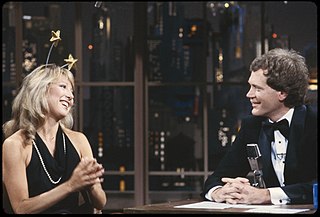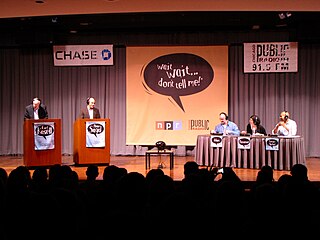
A game show is a genre of broadcast viewing entertainment where contestants compete in a game for rewards. The shows are typically directed by a host, who explains the rules of the program as well as commentating and narrating where necessary. The history of the game shows dates back to the late 1930s when both radio and television game shows were broadcast. The genre became popular in the United States in the 1950s, becoming a regular feature of daytime television.
Reality television is a genre of television programming that documents purportedly unscripted real-life situations, often starring unfamiliar people rather than professional actors. Reality television emerged as a distinct genre in the early 1990s with shows such as The Real World, then achieved prominence in the early 2000s with the success of the series Survivor, Idol, and Big Brother, all of which became global franchises. Reality television shows tend to be interspersed with "confessionals", short interview segments in which cast members reflect on or provide context for the events being depicted on-screen; this is most commonly seen in American reality television. Competition-based reality shows typically feature the gradual elimination of participants, either by a panel of judges, by the viewership of the show, or by the contestants themselves.

A talk show is a television programming, radio programming or podcast genre structured around the act of spontaneous conversation.A talk show is distinguished from other television programs by certain common attributes. In a talk show, one person discusses various topics put forth by a talk show host. This discussion can be in the form of an interview or a simple conversation about important social, political or religious issues and events. The personality of the host shapes the tone and style of the show. A common feature or unwritten rule of talk shows is to be based on "fresh talk", which is talk that is spontaneous or has the appearance of spontaneity.

A panel show or panel game is a radio or television game show in which a panel of celebrities participate. Celebrity panelists may compete with each other, such as on The News Quiz; facilitate play by non-celebrity contestants, such as on Match Game and Blankety Blank; or do both, such as on Wait Wait Don't Tell Me. The genre can be traced to 1938, when Information Please debuted on U.S. radio. The earliest known television panel show is Play the Game, a charades show in 1946. The modern trend of comedy panel shows can find early roots with Stop Me If You've Heard This One in 1939 and Can You Top This? in 1940. While panel shows were more popular in the past in the U.S., they are still very common in the United Kingdom.
Broadcast syndication is the practice of content owners leasing the right to broadcast their content to other television stations or radio stations, without having an official broadcast network to air it on. It is common in the United States where broadcast programming is scheduled by television networks with local independent affiliates. Syndication is less widespread in the rest of the world, as most countries have centralized networks or television stations without local affiliates. Shows can be syndicated internationally, although this is less common.

The $64,000 Question is an American game show broadcast in primetime on CBS-TV from 1955 to 1958, which became embroiled in the 1950s quiz show scandals. Contestants answered general knowledge questions, earning money which doubled as the questions became more difficult. The final question had a top prize of $64,000, hence the "$64,000 Question" in the show's title.
A Sunday morning talk show is a television program with a news/talk/public affairs–hybrid format that is broadcast on Sunday mornings. This type of program originated in the United States, and has since been used in other countries.
Twenty questions is a spoken parlor game which encourages deductive reasoning and creativity. It originated in the United States and was played widely in the 19th century. It escalated in popularity during the late 1940s, when it became the format for a successful weekly radio quiz program.

The TV Week Logie Awards is an annual ceremony celebrating and honouring the best shows and stars in Australian television, sponsored and organised by the magazine TV Week. The event is telecast live and billed as "television's night of nights". The first ceremony was hosted in 1959 as the TV Week Awards.
In broadcast programming, dayparting is the practice of dividing the broadcast day into several parts, in which a different type of radio programming or television show appropriate for that time period is aired. Television programs are most often geared toward a particular demography, and what the target audience typically engages in at that time.

Rove, also titled Rove Live, is an Australian television variety show that featured live music performances and interviews with local and international celebrity guests. The program premiered on the Nine Network on 22 September 1999, before moving to Network Ten which aired the program from 2000 until November 2009. The show was hosted by comedian Rove McManus through his production company Roving Enterprises, and featured an ensemble cast who presented various segments throughout the course of the show. The show won the Logie Award for "Most Popular Light Entertainment Program" five times.
Information Please is an American radio quiz show, created by Dan Golenpaul, which aired on NBC from May 17, 1938, to April 22, 1951. The title was the contemporary phrase used to request from telephone operators what was then called "information" and later called "directory assistance".

60 Minutes is an Australian version of the American newsmagazine television show of the same title, airing on the Nine Network since 1979 on Sunday nights. A New Zealand version uses segments of the show. The program is one of five inducted into Australia's television Logie Hall of Fame.
The Footy Show was an Australian sports and variety entertainment television program which aired on the Nine Network. The show was dedicated to the Australian Football League (AFL) and Australian rules football. The show featured a panel of hosts and a rotating regular panel of guests.
Daytime is a block of television programming taking place during the late-morning and afternoon on weekdays. Daytime programming is typically scheduled to air between the hours of 9:00 a.m. and 5:00 p.m., following the early morning daypart typically dedicated to morning shows and preceding the evening dayparts that eventually lead into prime time.

Q+A, formerly Q&A and also referred to as Qanda, is an Australian television panel discussion program broadcast on ABC Television. The show, which has run continuously since 2008, as of 2023 broadcasts on Monday nights at 9:35 pm. Its format is similar to Question Time on the BBC and Questions and Answers on RTÉ.

A television show, TV program, or simply a TV show, is the general reference to any content produced for viewing on a television set that is traditionally broadcast via over-the-air, satellite, or cable. This includes content made by television broadcasters and content made for broadcasting by film production companies. It excludes breaking news, advertisements, or trailers that are typically placed between shows. Television shows are most often scheduled for broadcast well ahead of time and appear on electronic guides or other TV listings, but streaming services often make them available for viewing anytime. The content in a television show is produced by one of two production methodologies: live taped shows such as variety and news magazine shows shot on a television studio stage or sporting events The other production model includes animation and a variety of film productions ranging from movies to series. Shows not produced on a television studio stage are usually contracted or licensed to be made by appropriate production companies.
The Project is an Australian news-current affairs and talk show television panel program, airing weeknights and Sunday across Australia on Network 10, produced by Roving Enterprises. The show is hosted by Waleed Aly, Sarah Harris, Georgie Tunny, Hamish Macdonald, Rove McManus, Sam Taunton and Michael Hing with rotating daily panellists usually appearing once a week.

A discussion moderator or debate moderator is a person whose role is to act as a neutral participant in a debate or discussion, holds participants to time limits and tries to keep them from straying off the topic of the questions being raised in the debate. Sometimes moderators may ask questions intended to allow the debate participants to fully develop their argument in order to ensure the debate moves at pace.

A panel discussion, or simply a panel, involves a group of people gathered to discuss a topic in front of an audience, typically at scientific, business, or academic conferences, fan conventions, and on television shows. Panels usually include a moderator who guides the discussion and sometimes elicits audience questions, with the goal of being informative and entertaining. Film panels at fan conventions have been credited with boosting box office returns by generating advance buzz.










